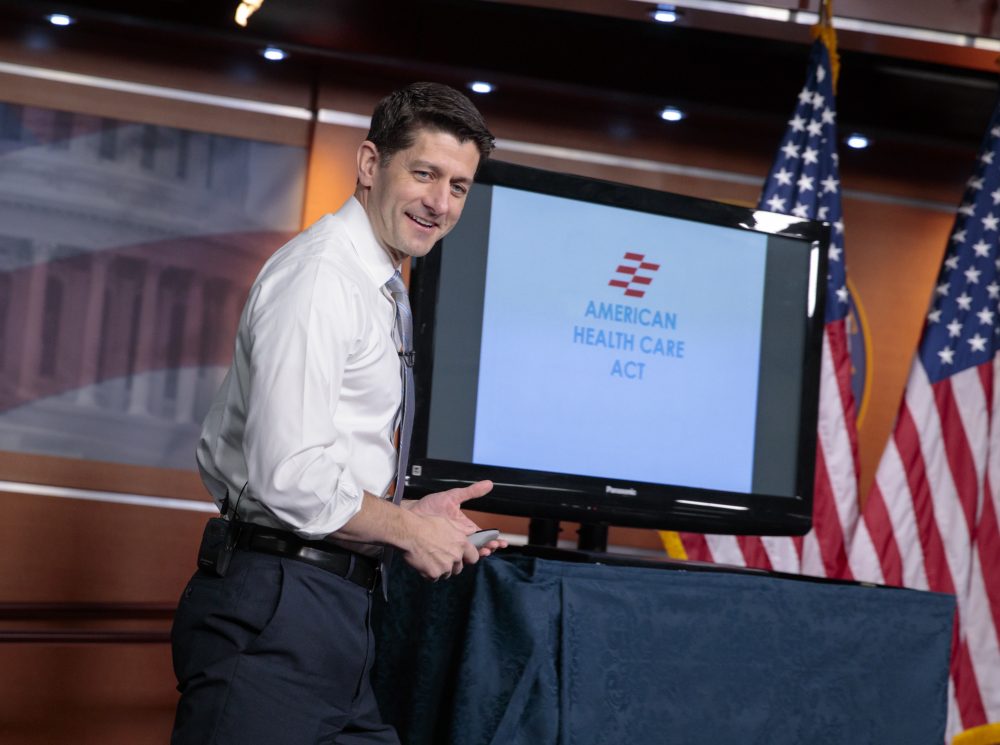Advertisement
What The House GOP Health Bill Would Mean For Mass.
Resume
At least half a million Massachusetts residents are among the 24 million Americans who the nonpartisan Congressional Budget Office (CBO) says would no longer have health insurance by 2026 under the House GOP plan to repeal and replace Obamacare.
The plan’s key architect, Speaker Paul Ryan, says many Americans would be choosing to end coverage because they will no longer be forced to buy it.
But many Massachusetts residents say they would not have a choice; they'd be forced to drop coverage because it would not be affordable. Others applaud Ryan's plan to get rid of the individual mandate, but call the tax credits in his American Health Care Act (AHCA) a new entitlement program and don't think the AHCA will reduce their health insurance premiums.
Fearing Loss Of Medicaid Expansion
Kayla Scire, 26, is among the 300,000 Massachusetts residents who Ryan and the Trump administration say don't belong on Medicaid. She gets coverage through what's known as the Obamacare Medicaid Expansion. It opened the program to single adults earning up to 138 percent of poverty, which translates to $16,643. Lots of graduate school students in Massachusetts are covered through this program, which is one reason the AHCA is a hot topic these days at the Brandeis Heller School for Social Policy and Management, where Scire is working toward two degrees.
"It scares me, and it scares a lot of my peers, for a few different reasons. Probably the biggest reason being it does phase out funding for Medicaid expansion," Scire says.

The House Republican plan would phase out that expansion by 2020 and offer tax credits to Americans who'd have the option of buying insurance on their own — $2,000 for 20-somethings like Scire.
Right now, if Scire had to buy coverage on her own, she could expect to spend in the range of $2,500 a year on her insurance premium and with co-pays and deductibles, as much as $7,000. So with a $2,000 tax credit, she could be out $5,000 a year, almost half her part-time income. She expects to be working full time by 2020, perhaps in a job that offers health insurance. If not, Scire says she'd likely go without.
"I’m a very risk-averse person, so for me to say that is kind of a lot," Scire says. "But I’m going to have substantial graduate school debt. If I add another big bill on top of that, I just don’t know if that’s going to feel worth it to me."
Scire isn't sure the coverage would be "worth it" because the health insurance under the Ryan plan would not cover as many services and would shift more costs to patients, according to the CBO.
"People would be buying skimpier plans, coverage that has higher deductibles or higher co-payments," says Cynthia Cox, associate director for the Program for the Study of Health Reform and Private Insurance at the Kaiser Family Foundation.
And, says Cox, older people would not be buying health insurance as much under the Republican bill, which means fewer people buying expensive premium plans, which brings down the average cost of insurance all around.
Concerns Among Older Residents
One of those older Massachusetts residents who expects to be priced out of the insurance market if the Ryan plan, or something similar, becomes law is photographer Craig Bailey. This 59-year-old, who is covered under the Medicaid expansion, has avoided taking a close look at how he’d fare under the House GOP plan because he's worried doing so would worsen his main health problem: high blood pressure.

If Bailey shopped for health insurance today, he’d pay roughly twice as much as Scire — more than $5,000 a year for the premium. His total health care costs, including co-pays and deductibles, could eat up half of Bailey’s income some years. Under Ryan's plan, Bailey would be eligible for a $3,500 tax credit, but he says the cost would still be unrealistic.
"I’ve been a health insurance fugitive before in going without it," Bailey says. "With or without insurance, prevention is the path that I’m trying to take."
And Bailey is catching up on all the doctor and dentist visits he can while he still has insurance.
There's another potential earthquake awaiting older Americans if Republicans replace Obamacare. It limits the difference between what insurers can charge younger and older individuals to 3:1. Massachusetts has an even tighter limit, 2:1, meaning an insurer can't charge an older member more than twice what it charges a young adult. The Ryan plan would allow a 5:1 spread.
Jill Madigan, an independent contractor in her early 60s, estimates her premium payment would balloon from $8,300 a year to more than $20,000. She'd be eligible for the maximum tax credit of $4,000. Madigan says older Americans who buy insurance on their own are doomed if the House GOP plan passes.
"They're not helping people," Madigan says. "Health care should not be a market commodity. It's something that everyone should be entitled to regardless of your financial situation. They're making it all about whether you can pay or not."
Insurers say the a change to 5:1 would not be this dramatic, and there's no call right now in Massachusetts to allow insurers to charge more than 2:1.
The Ryan plan would also replace subsidies that 184,869 Massachusetts residents use to buy health insurance with tax credits, which would mean a steep jump in health care costs for Cristina Gutierrez, a 54-year-old nanny from East Boston.

She pays $154 a month now for subsidized coverage through the Health Connector. Gutierrez says the full cost of that plan would be about $400 a month. She would get a $3,500 tax credit, but Gutierrez would have to pay almost a quarter of her income toward health care before she files taxes. She too says she'd have no choice but to stop buying insurance.
"I can’t afford it. I know it’s really important for everybody to have a health plan, but if I can’t pay, what can I do?" Gutierrez says.
Gutierrez is well aware of the value of health insurance. She had both hips replaced three years ago. She remembers seeing the first bill come in — for anesthesia. It was more than $7,000. Gutierrez called MassHealth, her coverage at the time, to work out a payment plan. She imagined sending in a check for $200 a month for the rest of her life.
"They told me, 'Don't worry, you don't have to pay,' " Gutierrez says, laughing and shaking her head. "MassHealth saved my life."
But if the AHCA becomes law, Gutierrez says the state should no longer require health insurance. The individual mandate is still state law in Massachusetts and would remain in effect even if the federal mandate is repealed. There are calls to repeal it from both low-income residents and Republicans who never liked the mandate.
"This is the land of the free and the home of the brave. People should be able to make up their own mind whether they want to buy health insurance or not," says Lou Murray, a Trump delegate from Quincy.
Murray does not like the tax credits in the House GOP plan because he says they would create a new entitlement program.
The credits would benefit residents who earn more than $50,000 a year as an individual, too much to qualify for any health insurance assistance under Obamacare. But Murray and Patrick Walsh, another Trump supporter, say the Ryan plan does not do enough to bring down the cost of health insurance.
"President Trump promised to cover everyone and lower the cost of health insurance and he will deliver," Walsh says. "This is just the start of the process."
'That’s A Lot Of Money'
Many health care experts say Trump would have to part ways with Ryan to fulfill that promise.
Overall, "the House bill would be a transfer of financial resources from lower-income people to higher-income people, from older people to younger people, and from people who live in high-cost areas to people who live in low-cost areas," says Cox, of the Kaiser foundation.
The Ryan plan and other Obamacare replacement options proposed by GOP leaders all present a major challenge for states because they would cut federal spending on Medicaid.
Massachusetts relies on about $10.5 billion in federal Medicaid matching funds this year. The CBO says Ryan's plan would cut Medicaid spending nationwide by $880 billion by 2026. It's not clear exactly what that would mean for Massachusetts, but Harvard economics professor David Cutler says any significant loss would be challenging.
"If the state of Massachusetts is going to make it up, that’s a lot of money that the state of Massachusetts is going to have to help with," Cutler says.
Gov. Charlie Baker said again this week that he's committed to affordable health coverage for all.
"We want to make sure that we are able to continue to deliver for the 97 percent-plus of the population here in Massachusetts that’s currently covered under our existing system," Baker said.
It's hard to see how Massachusetts could make good on that commitment without steady support from the federal government. But there are a lot of Massachusetts residents hanging on those words.

Christopher Brown, a jazz musician in Watertown, practices every day for four hours, teaches for another four, and books as many gigs in clubs as he can. But his earnings make him eligible for Medicaid, under the expansion.
Brown, 36, says he needs health insurance. He burned his eye while on stage in December and couldn't have paid the bills from Mass Eye and Ear on this own. But Brown says if he can't get coverage through Medicaid, he'd have to stop trying to make it as a musician and get a job outside his field.
"It feels really bad to have to say that," Brown says, "but you have to be realistic, that that's just not possible in this country, to be able to follow your dreams."
While Massachusetts tries to figure what it could afford to do to keep helping low- and moderate- income residents get coverage, Speaker Ryan and his team are working to shore up support for a full vote in the U.S. House.
Key Senate Republicans have said they do not expect to pass the Ryan bill without significant changes.
This article was originally published on March 15, 2017.
This segment aired on March 15, 2017.
